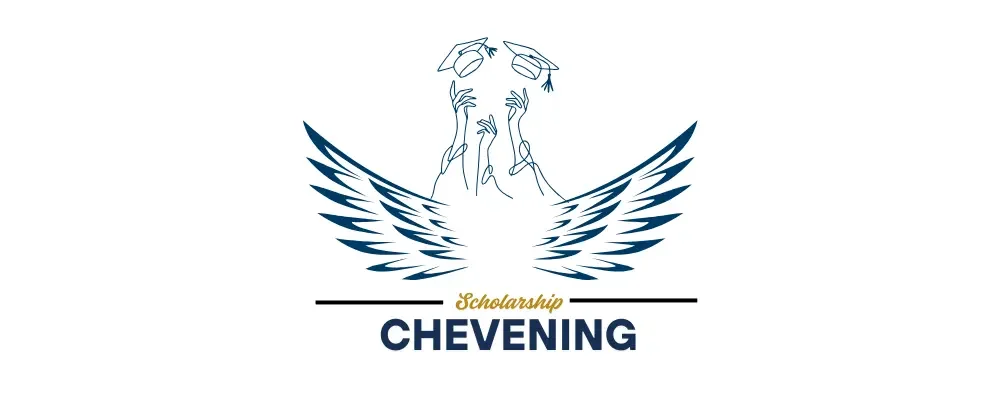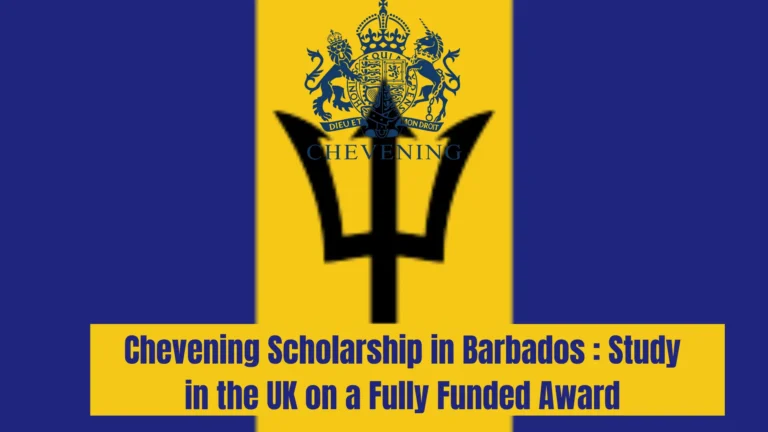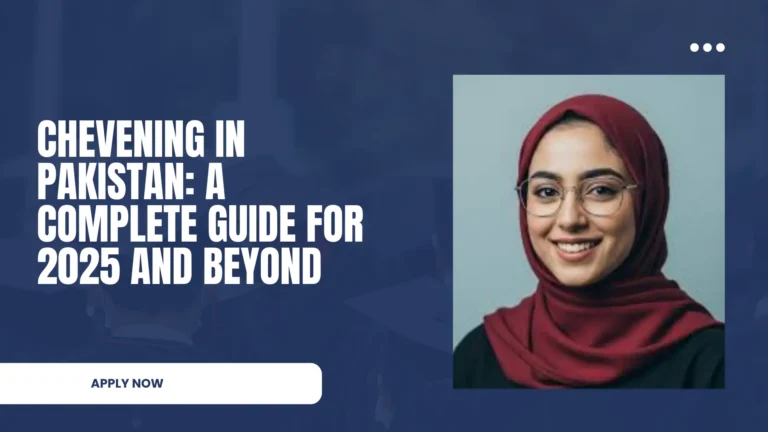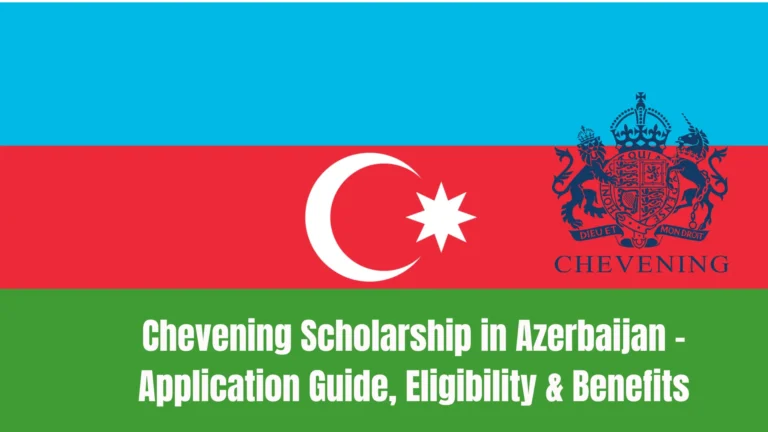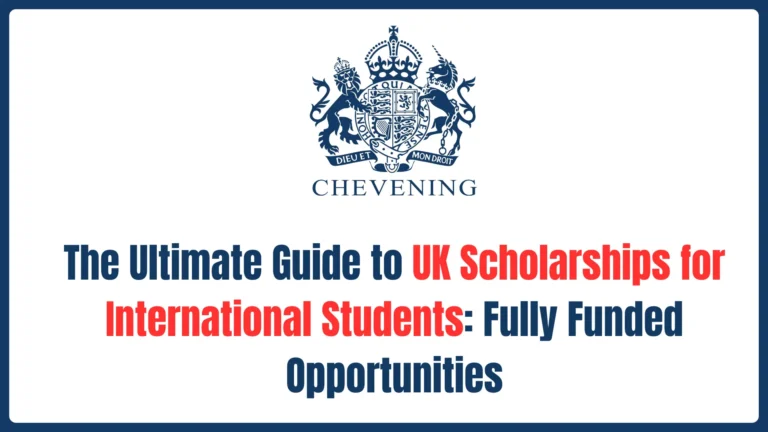Chevening Scholarships 2026: Your Ultimate Guide to Studying in the UK (And How to Actually Win One)
Look, I’m not going to sugarcoat it. Landing a Chevening Scholarship feels a bit like winning the lottery—except instead of relying on luck, you’re banking on your leadership potential, work experience, and ability to convince a panel of distinguished folks that you’re worth betting on.
But here’s the thing: every year, over 1,500 students from across the globe actually do win this lottery. They pack their bags, head to the UK, and spend a year studying at some of the world’s most prestigious universities—all expenses paid. And honestly? There’s no reason you can’t be one of them in 2026.
I’ve watched friends go through this process. Some sailed through; others crashed and burned spectacularly (one mate accidentally submitted his essay with track changes still visible—don’t be that person). What separates the winners from the “maybe next year” crowd? That’s exactly what we’re diving into today.
What Exactly Is the Chevening Scholarship, Anyway?
Think of Chevening as the UK government’s way of investing in future global leaders. It’s their flagship international scholarship program, funded by the Foreign, Commonwealth & Development Office (FCDO) and partner organizations. Started back in 1983, it’s been quietly churning out an impressive network of over 55,000 alumni who’ve gone on to become presidents, prime ministers, Nobel laureates, and everything in between.
Here’s what you get if you win:
- Full tuition fees (yes, ALL of it)
- A monthly living allowance (enough to actually live, not just survive on instant noodles)
- Return airfare to the UK
- Arrival and departure allowances
- The cost of one visa application
- A travel grant to attend Chevening events in the UK
But beyond the money—and trust me, we’re talking upwards of £30,000-£50,000 in total value—you’re joining an exclusive club. The Chevening network opens doors that stay closed to most people. We’re talking access to events, mentorship, and connections that can legitimately change your career trajectory.
Am I Actually Eligible for Chevening Scholarships 2026?
Here’s where things get specific. The eligibility criteria aren’t particularly flexible, so let’s break them down clearly:
The Non-Negotiables
1. Citizenship: You must be a citizen of a Chevening-eligible country or territory. The list includes over 160 countries, but notably excludes the USA and EU countries. Check the official Chevening website to confirm your country’s status—this changes occasionally.
2. Work Experience: You need at least two years (2,800 hours) of work experience. And before you ask—yes, they actually check this. The experience can be cumulative from different jobs, and it can include:
- Full-time employment
- Part-time work (calculated proportionally)
- Voluntary work
- Internships and placements
Here’s a pro tip: start documenting your work experience now. Save those employment letters, contracts, and anything that proves you’ve actually done what you claim. I know someone who lost out because they couldn’t verify their hours adequately. Don’t let that be you.
3. Education: You must have an undergraduate degree that will allow you to gain entry to a postgraduate program at a UK university. This typically means:
- A second-class upper honors degree (2:1) or equivalent
- Some universities might accept a 2:2 with relevant work experience
4. University Offers: This is where it gets interesting. You need to apply to three different eligible UK university courses and have received an unconditional offer from one of them by July 2026. Note: you choose the universities and courses yourself—Chevening doesn’t assign them.
5. Return Home: You must return to your country of citizenship for a minimum of two years after your scholarship ends. This isn’t optional; it’s a commitment you’re making.
The Deal-Breakers
You’re NOT eligible if you:
- Hold British or dual-British citizenship
- Have previously studied in the UK with funding from a UK government-funded scholarship
- Are currently employed by or are applying on behalf of the UK government
- Already hold a Master’s degree (or higher) that was funded or partially funded by a UK government-funded scholarship
The Chevening Scholarship 2026 Timeline: Mark Your Calendar
Let me tell you something about deadlines—they’re going to sneak up on you faster than you think. Based on previous years’ patterns, here’s what the Chevening 2026 timeline likely looks like:
| Phase | Estimated Date | What You Need to Do |
|---|---|---|
| Application Opens | August 2025 | Start your online application, begin drafting essays |
| Application Deadline | Early November 2025 (typically first Tuesday) | Submit your complete application by 12:00 GMT |
| Interview Period | February – June 2026 | Attend your interview if shortlisted |
| University Offers Deadline | Mid-July 2026 | Secure unconditional offers from UK universities |
| Final Scholarship Decisions | June – July 2026 | Receive notification of scholarship award |
| Pre-Departure | August – September 2026 | Visa processing, travel arrangements |
| Departure to UK | September – October 2026 | Begin your Master’s program |
Important note: The application deadline is absolutely non-negotiable. The system closes at midnight GMT, and there are no extensions, no exceptions. One year, the website crashed due to high traffic in the final hours. Set yourself a personal deadline of at least 48 hours before the official one.
Cracking the Chevening Scholarship Application Process 2026
Alright, let’s get into the actual mechanics. The application process has several moving parts, and you need to nail each one.
Step 1: Create Your Online Account
Head to the Chevening website and register. Sounds simple, right? It is. But here’s what most people don’t tell you: the application form auto-saves, but it doesn’t auto-draft your essays elsewhere. I recommend writing your essays in a separate document first, then pasting them in. You’ll thank me when your internet cuts out mid-sentence.
Step 2: Choose Your Three UK Universities and Courses
This is more strategic than you might think. You’re not just picking names out of a hat. Consider:
Academic Reputation: Obviously, you want quality. But also consider which universities are particularly strong in your specific field. The London School of Economics might be globally renowned, but if you’re studying environmental science, maybe look at Imperial College or the University of Edinburgh.
Location: London is expensive. Like, really expensive. Manchester, Birmingham, Glasgow, and Edinburgh offer excellent universities with significantly lower living costs. Your Chevening stipend goes further outside London.
Course Alignment: Your three courses don’t have to be identical, but they should show a coherent career trajectory. Jumping from International Relations to Computer Science to Art History looks unfocused.
Networking Opportunities: Some universities have particularly strong Chevening scholar communities or connections with your home country. This matters more than you’d think.
| University | Strengths | Typical Living Costs (Monthly) | Chevening Alumni Network |
|---|---|---|---|
| Oxford | PPE, Law, International Relations | £1,200-£1,600 | Extensive |
| Cambridge | Sciences, Engineering, Economics | £1,200-£1,600 | Extensive |
| LSE | Economics, Politics, Social Sciences | £1,400-£1,800 | Very Strong |
| Imperial College | STEM, Business | £1,400-£1,800 | Strong |
| Edinburgh | Law, Arts, Medicine | £1,000-£1,400 | Strong |
| Manchester | Business, Engineering, Sciences | £900-£1,300 | Growing |
Step 3: The Four Essays (This Is Where You Win or Lose)
Let me be blunt: your essays are everything. You could have a perfect GPA and Nobel Prize-worthy recommendations, but if your essays are generic, boring, or poorly written, you’re done.
You’ll need to write four essays, each around 500 words:
Essay 1: Leadership and Influence
The Question: “Chevening is looking for individuals who will be future leaders or influencers in their home countries. Explain how you meet this requirement, using clear examples of your own leadership and influencing skills to support your answer.”
What They’re Really Asking: Show us you can get things done and bring people along with you.
How to Nail It:
Don’t just list positions. Anyone can be given a title. They want to see impact. Use the STAR method (Situation, Task, Action, Result) for each example.
Bad example: “I was team leader for a community project.”
Good example: “When our local hospital faced a 40% shortage in blood donations, I mobilized a team of 15 volunteers, partnered with three local radio stations, and organized a month-long campaign that resulted in 500+ new donors—exceeding our target by 25%.”
See the difference? Numbers, specific actions, measurable results.
Essay 2: Networking
The Question: “Chevening is looking for individuals with strong networking skills who will engage with the Chevening community and influence and lead others in their chosen profession. Explain how you meet this requirement, using clear examples of your networking skills and outline how you hope to use these skills in the future.”
What They’re Really Asking: Are you going to be an active alumni member, or will you take the money and disappear?
How to Nail It:
They don’t want to hear about how many LinkedIn connections you have. They want real examples of how you’ve built relationships that created value—for yourself and others.
Good examples include:
- Organizing professional networks or associations
- Creating platforms that connect people
- Leveraging relationships to achieve collaborative goals
- Mentoring others in your field
And crucially: explain how you’ll engage with the Chevening network specifically. Research their events, their alumni activities. Show you’ve done your homework.
Essay 3: Studying in the UK
The Question: “Outline why you have selected your chosen three university courses, and explain how this relates to your previous academic or professional experience and your plans for the future.”
What They’re Really Asking: Have you actually thought this through, or are you just chasing a free degree?
How to Nail It:
Create a narrative arc: Past → Present → Future
- Past: Explain your background and what sparked your interest in this field
- Present: Show why NOW is the right time for this degree and why the UK specifically
- Future: Connect it to specific career goals back home
Be specific about course modules, professors, research centers. Generic statements like “Oxford has world-class facilities” won’t cut it. Try: “Professor Smith’s work on climate adaptation in developing economies directly aligns with my goal of implementing sustainable policy in my home country’s agricultural sector.”
Essay 4: Career Plan
The Question: “Outline your immediate plans upon returning home and your longer-term career goals. You may wish to consider how these relate to what the UK government is doing in your country.”
What They’re Really Asking: Are you going to use this investment to benefit your country, or are you planning to brain-drain to a Western country?
How to Nail It:
Be ambitious but realistic. Don’t say you’ll become president (even if you secretly hope to). Instead:
Short-term (1-3 years): Specific role in a specific organization doing specific work
Medium-term (3-7 years): How you’ll expand your influence
Long-term (7+ years): Broader impact on your country/region
And yes, mention UK-your country relations if relevant. Research what the UK is investing in or partnering on with your country. Show you understand the bigger picture.
Step 4: References
You need two references from people who’ve known you professionally for at least three years. Not your uncle who runs a business. Not your professor who gave you an A but barely remembers your name.
Ideal referees:
- Direct supervisors or managers
- Professors you’ve worked closely with on research
- Directors of organizations where you’ve had significant involvement
What makes a strong reference:
Your referees don’t just upload a letter and disappear. They’ll receive a questionnaire rating you on various competencies. Brief them thoroughly. Share your essays. Explain what Chevening is looking for. Make their job easy, and they’ll write you a better reference.
How to Prepare for the Chevening Scholarship Interview 2026
If you make it to the interview stage—and statistically, only about 15-20% of applicants do—congratulations. But don’t celebrate too hard yet. The interview is where strong applications sometimes fall apart.
What to Expect
Interviews typically last 20-30 minutes and are conducted by a panel of 3-4 people, usually including:
- British embassy or high commission staff
- Chevening alumni
- Occasionally, representatives from partner organizations
The format is usually:
- Introduction and ice-breaker question
- Questions based on your essays
- Questions testing your knowledge of UK-your country relations
- Questions about current affairs and your field
- Your opportunity to ask questions
Common Interview Questions
On Leadership:
- “Give an example of when you had to lead a team through a difficult situation.”
- “Tell us about a time your leadership approach failed. What did you learn?”
On Networking:
- “How would you contribute to the Chevening community?”
- “Who would you most like to meet in the UK and why?”
On Your Studies:
- “Why these specific universities and courses?”
- “How will this degree change your career trajectory?”
On UK Relations:
- “What do you think is the most significant challenge facing UK-[your country] relations?”
- “How can your field contribute to strengthening bilateral ties?”
Curveball Questions:
- “If you weren’t accepted for Chevening, what would you do?”
- “What’s your biggest weakness as a leader?”
- “If you could change one policy in your country, what would it be?”
Interview Tips That Actually Work
1. Know Your Essays Inside Out
They’re sitting there with your application in front of them. If you contradict something you wrote or can’t elaborate on a point, it looks bad. Really bad.
2. Research Current Events
Especially anything involving the UK and your country. Read The Guardian, BBC News, and reputable news sources from your home country. If something major happens the week before your interview, have an informed opinion on it.
3. Dress Appropriately
Business formal. This isn’t the time for creative expression through clothing. Think: job interview at a bank.
4. Be Yourself (But the Best Version)
They’re not looking for robots. They want genuine, passionate people who care about making a difference. Let your personality show—just keep it professional.
5. Prepare Questions
When they ask “Do you have any questions for us?” never say no. Have 2-3 thoughtful questions ready. Good examples:
- “What qualities do you see in successful Chevening scholars?”
- “How active is the Chevening alumni community in [your country]?”
- “What surprised you most about the UK during your time there?” (if asking an alumni panel member)
6. Handle Tough Questions Gracefully
If you don’t know an answer, don’t bluff. A simple “That’s not my area of expertise, but here’s what I do know…” is far better than making something up.
What Does the Chevening Scholarship 2026 Actually Cover?
Let’s talk money—because that’s what makes this opportunity so incredible.
Full Financial Package
Tuition Fees: Completely covered, regardless of the amount. Whether it’s £20,000 or £40,000, Chevening pays it.
Monthly Stipend: Based on whether you’re studying in London or elsewhere:
- London: ~£1,347 per month
- Outside London: ~£1,097 per month
This is meant to cover accommodation, food, local travel, and basic living expenses. It’s enough to live comfortably if you’re sensible about budgeting.
Travel Costs:
- One return economy airfare between your home country and the UK
- Travel costs to attend Chevening events within the UK
Additional Allowances:
- Arrival allowance: ~£1,250
- Departure allowance: ~£1,250
- Thesis/dissertation grant (if applicable): ~£1,000
- One visa application fee
What’s NOT Covered
- Dependents (partners and children cannot come with you on this scholarship)
- Additional personal travel
- Personal health costs beyond NHS coverage
- Additional courses or qualifications
The Real Value
When you add it all up, the total value of a Chevening Scholarship typically ranges from £35,000 to £50,000, depending on your university and course. That’s a life-changing amount of money for most people.
But here’s what the financial breakdown doesn’t show: the intangible value. Access to the Chevening network. The credential on your CV. The UK university experience. The doors that open when you return home as a Chevening alumnus. That’s priceless.
Top Tips to Win Chevening Scholarship 2026 (The Insider Stuff)
Alright, time for the good stuff—the things successful Chevening scholars wish someone had told them.
1. Start Early (Like, Really Early)
If you’re reading this in October 2025 and the deadline is in November, you’re already behind. The strongest applications come from people who started preparing months in advance. Begin working on your essays by August at the latest.
2. Get Your Essays Reviewed by Multiple People
And not just anyone. Find:
- Someone who knows you well professionally (to check authenticity)
- A strong writer or editor (to check clarity and flow)
- A Chevening alumnus if possible (to check strategic alignment)
Every single successful Chevening scholar I know had multiple people review their essays. Every. Single. One.
3. Show, Don’t Tell
“I am a natural leader” = weak
“When I organized a campaign that mobilized 200 volunteers and raised $50,000 for disaster relief in six weeks” = strong
Specific examples with measurable outcomes always beat vague claims.
4. Be Genuinely You
The panel reads hundreds of applications. They can smell insincerity from a mile away. If you’re naturally more introverted but build influence through thoughtful analysis and mentorship rather than charismatic speeches, own that. There’s no single “type” of leader they’re looking for.
5. Tailor Everything to Your Country’s Context
Generic applications fail. The UK government is investing in you specifically to return home and make a difference there. Every example, every goal, every plan should be rooted in your country’s specific challenges and opportunities.
6. Research Your Interviewers (If Possible)
LinkedIn is your friend. If you know who’s on your interview panel, understanding their backgrounds can help you connect better and anticipate their questions.
7. Apply University Pressure Strategically
Some applicants make the mistake of emailing professors or universities trying to get special consideration. Don’t do this for Chevening—it doesn’t work and might actually hurt you. Instead, focus that energy on crafting the best application possible.
8. Join the Conversation
Follow Chevening on social media. Join applicant groups. Read blogs from past scholars. Understand the community you’re trying to join. This will give you insights that help your application stand out.
9. Mind Your Online Presence
They might Google you. Make sure your LinkedIn is professional and updated. Clean up any questionable social media content. You don’t need to be boring, just professional.
10. Have a Backup Plan
Only about 2-3% of applicants receive Chevening. The odds are tough. Apply to other scholarships simultaneously. Commonwealth Scholarships, Gates Cambridge, Rhodes—cast a wide net.
Frequently Asked Questions About Chevening Scholarships 2026
Can I apply for a PhD with Chevening?
No. Chevening only funds one-year Master’s degrees. If you want a PhD, look at other programs like Commonwealth Scholarships.
Can I defer my Chevening Scholarship?
Generally, no. If you’re selected for 2026, you must start in 2026. Special circumstances might be considered, but don’t count on it.
Can I work while on my Chevening Scholarship?
You can work up to 20 hours per week during term time and full-time during holidays, as per UK visa regulations. But honestly? Your course will keep you busy enough.
What if I don’t get unconditional offers from my chosen universities?
This is a problem. You need at least one unconditional offer by the deadline. Choose your universities wisely and have backup options in mind.
Can I apply if I’m already in the UK?
No. You must be living in your home country when you apply and when you start the scholarship.
How competitive is Chevening really?
Very. About 50,000-60,000 people apply globally each year for approximately 1,500 scholarships. That’s a 2-3% acceptance rate—more selective than most Ivy League universities.
Can I choose any Master’s program?
Almost. The course must be a full-time Master’s degree at an eligible UK university. Distance learning, part-time courses, and certain professional qualifications don’t count.
What happens if I fail to return home after my scholarship?
You’ll be required to repay the full cost of your scholarship. Chevening tracks this, and they will come after the money. Don’t risk it.
Success Stories: Real Chevening Scholars Who Made It
Let me share a few examples that might inspire you:
Amira from Kenya applied three times before winning. Her first two applications were solid but generic. On her third attempt, she completely rewrote her essays to focus specifically on renewable energy solutions for rural Kenya. She framed her entire application around bringing UK expertise back to solve a pressing local problem. She’s now leading a solar energy initiative that’s brought electricity to 30,000 homes.
Carlos from Colombia nearly didn’t apply because he thought his work experience as a teacher wouldn’t be “impressive” enough. But he wrote brilliantly about how he’d transformed his school’s curriculum to include peace education in a post-conflict region. His leadership in a challenging context stood out precisely because it was authentic and impactful in his community.
Fatima from Pakistan was rejected after her interview the first year—she was too nervous and gave generic answers. She reapplied, prepared better, and specifically researched UK-Pakistan education partnerships. When asked about bilateral relations, she discussed specific programs and how her work would complement them. Night and day difference in her second interview.
The common thread? None of them were perfect. But they were genuine, prepared, and strategic.
The Reality Check: Is Chevening Right for You?
Before you invest dozens of hours into this application, ask yourself honestly:
Are you truly planning to return home? If you’re secretly hoping to parlay this into permanent UK residency, don’t apply. Chevening has a mandatory return clause, and they enforce it.
Can you handle a year away? It’s intense. You’ll be far from home, juggling a demanding academic program, networking events, and adaptation to a new culture. It’s incredible, but it’s also challenging.
Is your career trajectory clear? If you don’t know what you want to do with this degree, that will show in your application. You need a compelling story about why this specific qualification at this specific time will enable specific goals.
Are you comfortable with public representation? As a Chevening scholar, you’re representing both your country and the program. You’ll be expected to participate in events, speak publicly, and be an ambassador. If that sounds terrible, this might not be for you.
Your Action Plan: What to Do Right Now
Alright, enough talking. Here’s your concrete action plan:
Immediate Actions (This Week):
- Check your eligibility thoroughly on the official Chevening website
- Start researching UK universities and courses
- Begin documenting your work experience with proof
- Identify potential referees and have informal conversations with them
Short-term Actions (Next Month):
- Draft your four essays
- Research current UK-your country relations and initiatives
- Update your CV
- Begin your university applications in parallel
- Join Chevening application groups for peer support
Medium-term Actions (Next 2-3 Months):
- Revise essays based on feedback (get at least 3 people to review)
- Brief your referees thoroughly
- Finalize your university course selections
- Practice interview questions with someone
- Submit your application at least 48 hours before the deadline
If You’re Shortlisted for Interview:
- Research your interview panel
- Prepare answers to common questions
- Study current affairs religiously
- Do mock interviews
- Prepare thoughtful questions to ask them
The Bottom Line
Look, Chevening isn’t easy to get. The odds are objectively tough, and the application process demands significant time and effort. But here’s what I know: every year, about 1,500 people do get it. They’re not all geniuses. They’re not all from elite backgrounds. They’re just people who had a clear vision, prepared thoroughly, and articulated why they deserved this opportunity.
The scholarship can genuinely change your life. I’ve seen it happen. The education, the network, the credential—they open doors that stay closed to most people. Whether it’s landing your dream job, launching a social enterprise, influencing policy, or simply having a transformative year of learning and growth, Chevening delivers.
But you have to put in the work. Start now. Be strategic. Be authentic. And most importantly, believe that you deserve to be in that 2-3% who make it.
The UK is waiting. Your future is waiting. What are you going to do about it?
Ready to start your Chevening journey? Head to the official Chevening website, bookmark this guide, and let’s make 2026 your year. And hey—when you’re successful (notice I said when, not if), come back and tell me about it. I’d love to hear your story.
Have questions about Chevening Scholarships 2026? Drop them below, and I’ll do my best to help. We’re in this together.
